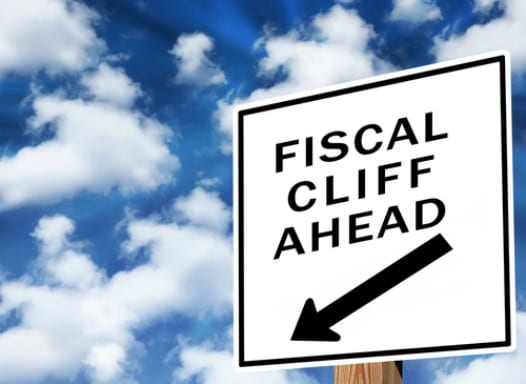Five Things You Need to Know About the ‘Fiscal Cliff’
Where do you stand on the so-called “fiscal cliff,” which the U.S. economy may or may not be stepping off of at midnight Dec. 31?
Before you answer, read over this list of five things you need to know about the “fiscal cliff.”
1. What is the “fiscal cliff”?
In simple terms, it is a law that requires across-the-board spending cuts and the expiration of several tax cuts, unless Congress and President Obama can reach an agreement before Dec. 31, 2012. It was enacted by Congress in the summer of 2011 after Democrats and Republicans came to an impasse over raising the debt-ceiling limit. They passed the “Budget Control Act” to force themselves to deal with the exploding deficit. The Budget Control Act calls for $1.2 trillion in automatic budget cuts over 10 years, $1.2 billion of which is due to happen in 2013.
The debt ceiling is a legislative instrument enacted in 1917 to force the president and Congress to be more accountable with fiscal policy. When they get close to the prescribed debt ceiling, the president and Congress usually just vote to raise it higher, which they have done 10 times in the last 10 years. The current debt ceiling is $16.694 trillion, and the United States will go over that unless it solves the “fiscal cliff” crisis. That could cause calamity in the financial markets.
2. Where did the term “fiscal cliff” come from?
Federal Reserve Chairman Ben Bernanke is credited with popularizing (not coining) the term when he told the House Financial Services Committee that, “Under current law, on January 2, 2013, there’s going to be a massive fiscal cliff of large spending cuts and tax increases.’’ That was on Feb. 29 of this year and headlines on newscasts that night and in newspapers around the country the next day seized on the phrase “fiscal cliff.” However, two weeks before that, a Reuters news agency story was headlined “Fiscal Cliff looms for United States.” Reuters generously punted credit, saying the term was already popular on Capitol Hill.
The oldest usage of the term dates to an article in The New York Times in 1957 that talked about homeowners going over a fiscal cliff. A 1982 editorial in the Chicago Tribune read: “Should the economy worsen or Congress approve all the new budget cuts proposed for the next year, a number of states are sure to go over the fiscal cliff.” According to the New Words Committee of the American Dialect Society, “fiscal cliff” is battling “Gangnam Style,” “Frankenstorm” and “YOLO” (You only live once) for word of the year.
3. Will you feel it if we step off the cliff?
Yes, your taxes are definitely going up if we step off the cliff. The White House estimates that the average American family of four will pay an additional $2,200 in taxes if the Bush tax cuts expire. Then there is the 2 percent Payroll Tax Cut that also could expire Dec. 31 and cost middle-income families an additional $672-$1,135. The Alternative Minimum Tax also could expire, which would mean about 30 million households would be hit with an additional tax of $100 or more. Finally, other tax credits for children and education could expire. If all of these taxes are allowed to expire, it will add an estimated $536 billion in revenues to the U.S. Treasury, or about $3,500 per household for middle-income earners.
4. What about spending cuts?
The U.S. military is going to be the hardest hit, with $55 billion in cuts expected in 2013, if an agreement is not reached. The Defense Department has begun working on cuts of 10 percent in more than 80 areas. Medicare payments to doctors would be cut by 30 percent, or about $14 billion. Federal benefits for the unemployed, which supplement state funds for payments up to 99 weeks, would end. The Congressional Budget Office forecasts a rise in unemployment to 9.1 percent, and the economy will shrink by 0.5 percent.
5. What are people saying about this?
The thoughts are as diverse as the subject. Here is a smattering from random sources:
Wisconsin Republican Congressman Paul Ryan, reported by The Daily Caller: “We’re nowhere. We’re farther than where we started. He (President Obama) took 40 minutes to reject the deal. That leads us to conclude he’s trying to get us to our fiscal cliff.”
Financial commentator Peter Schiff: “We can’t keep avoiding the pain and in the process making the problem worse, because then we’re just going to have even more pain in the future to fix an even bigger problem.”
Clay Cosby, University of Kansas student: “A failure to compromise on this issue, whether the cliff is only a matter of perception or not, would further characterize the dysfunction of the government and negatively impact our democratic process.”
David Fry at Exchange Trader Funds Digest: “Most of you remember the hype and angst over Y2K in late 1999, no doubt. But it turned out to be a non-event. The fiscal cliff seems profound in a different way, but may result in just another shrug.”
The People’s Daily, official newspaper of China: “A country such as the United States that is accustomed to telling other nations to be responsible, should, on the one big problem concerning the future of the global economy, show itself to be a responsible power. … This proves the U.S. political system has problems and lacks the responsibility that a big nation should have.”
Sources:
- McCutcheon, M. Fiscal Cliff Definition: What is This Wacky New Word and Where Did it Come From? Policymic.com. Retrieved from http://www.policymic.com/articles/20067/fiscal-cliff-2013-how-the-term-became-as-popular-as-gangnam-style
- Fiscal cliff. (2012). Investopedia.com. Retrieved from http://www.investopedia.com/terms/f/fiscalcliff.asp#axzz2ECI27KAK
- Phillip, A. (November 8, 2012). What the ‘Fiscal Cliff’ Means for Typical Pocketbooks. ABC News. Retrieved from http://abcnews.go.com/Business/fiscal-cliff-means-typical-pocketbooks/story?id=17673480#.UL-UCIandfw
- Baldor, L. (December 5, 2012). Pentagon begins planning for massive budget cuts. Albany Times Union.
- Khimm, S., Klein, E., Matthews, D., Plummer, B. (December 3, 2012). The Fiscal Cliff: Absolutely everything you could possibly need to know, in one FAQ. Washington Post. Message posted to http://www.washingtonpost.com/news/wonkblog/wp/2012/11/27/absolutely-everything-you-need-to-know-about-the-fiscal-cliff-in-one-faq/#spending


















